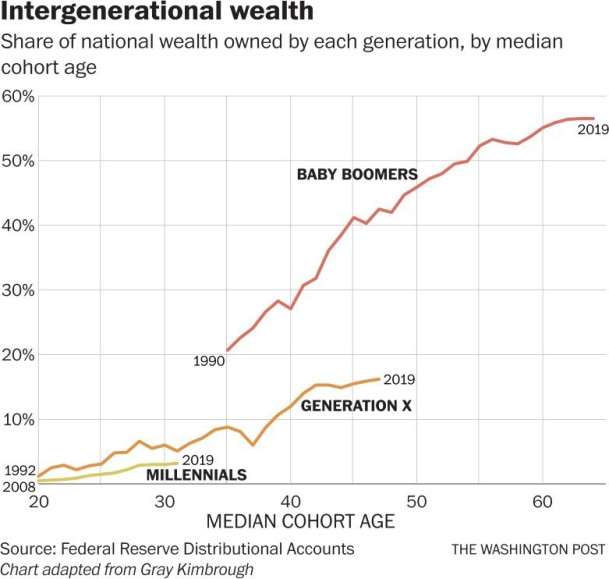From Girol Karacaoglu and RWER issue no.92 The growing disparity across generations, in their access to material sources of wellbeing such as income and wealth (including housing), has been well documented (Ingraham 2019, Wolf 2018). Figure 2 provides an example referring to the growing disparity of wealth across generations in the USA (Ingraham 2019). As Ingraham explains, “baby boomers – those born between 1946 and 1964 – collectively owned 21 percent of the nation’s wealth by the time their generation hit a median age of 35 in 1990. Generation X (born from 1965 to 1980) came of age during the era of wage stagnation and growing inequality ushered in by the 1970s and ’80s. When the typical Gen Xer reached 35 in 2008, his or her share of the nation’s wealth was just 9 percent, less
Topics:
Editor considers the following as important: Uncategorized
This could be interesting, too:
tom writes The Ukraine war and Europe’s deepening march of folly
Stavros Mavroudeas writes CfP of Marxist Macroeconomic Modelling workgroup – 18th WAPE Forum, Istanbul August 6-8, 2025
Lars Pålsson Syll writes The pretence-of-knowledge syndrome
Dean Baker writes Crypto and Donald Trump’s strategic baseball card reserve
from Girol Karacaoglu and RWER issue no.92
The growing disparity across generations, in their access to material sources of wellbeing such as income and wealth (including housing), has been well documented (Ingraham 2019, Wolf 2018). Figure 2 provides an example referring to the growing disparity of wealth across generations in the USA (Ingraham 2019).
As Ingraham explains, “baby boomers – those born between 1946 and 1964 – collectively owned 21 percent of the nation’s wealth by the time their generation hit a median age of 35 in 1990. Generation X (born from 1965 to 1980) came of age during the era of wage stagnation and growing inequality ushered in by the 1970s and ’80s.When the typical Gen Xer reached 35 in 2008, his or her share of the nation’s wealth was just 9 percent, less than half that of boomers at a comparable point in life. Millennials haven’t hit the 35 mark yet – that won’t happen until about 2023 – but their financial situation is relatively dire. They own just 3.2 percent of the nation’s wealth. To catch up to Gen Xers, they’d need to triple their wealth in just four years. To reach boomers, their net worth would need a sevenfold jump.”
In terms of sources of future wellbeing, there are emerging concerns on a much wider front than simply material sources: “Looking forward, there is no room for complacency. As storm clouds gather on the horizon, mainly from environmental and social challenges, all OECD countries need to take action if they are to maintain today’s well-being for future generations. read more

